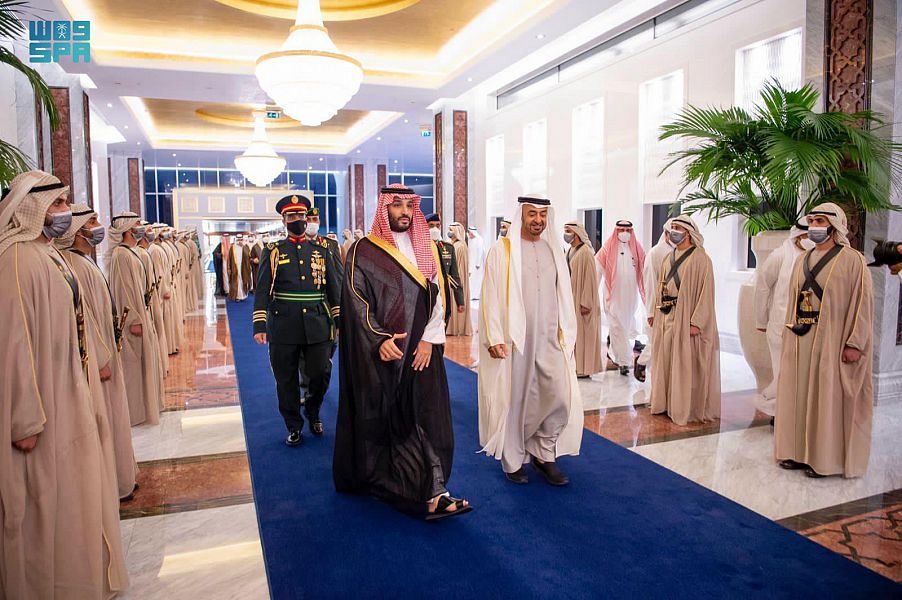
RIYADH: Saudi Arabia’s Crown Prince Mohammed bin Salman made a phone call to his Abu Dhabi counterpart Sheikh Mohammed bin Zayed, during which he condemned an attack on the UAE by the Iran-backed Houthi militia in Yemen.
The militia attacked the capital Abu Dhabi using missiles and drones, setting off explosions in fuel trucks that killed three people and injured six others and causing a fire near the airport.
And in another incident, eight explosive-laden drones were launched by the Houthis toward Saudi Arabia, all of which were intercepted.
The two leaders affirmed that these terrorist acts that targeted the Kingdom and the UAE would increase both countries’ “resolve and their determination to continue to confront those aggressive practices” carried out by the Houthi militia, who have wreaked havoc in Yemen, killing the Yemeni people and continue its “miserable and unsuccessful attempts to spread chaos” with the aim of destabilizing the region’s security and stability.
The crown princes called on the international community to stand up to these flagrant violations of international law and norms and to reject and condemn these terrorist crimes that threaten regional and international peace and security, a statement on Saudi Press Agency said.
The Saudi crown prince expressed his deepest condolences for the deceased and wished the injured a speedy recovery.
Sheikh Mohammed thanked Prince Mohammed for the sincere sentiments, which confirmed the solid ties and close bond that unite the two countries and peoples and their determination to confront terrorism.
During the call, they also discussed regional affairs and issues of common interest, the statement added.
Also on Monday, Saudi deputy minister for defense Prince Khalid bin Salman said the Houthis’ aggression against the Kingdom and UAE represented a threat to the security of the two countries and the entire region, and showed they were not interested in political solutions to the Yemeni conflict.
He added the militia had chosen an path of escalation and would bear responsibility for tampering with the future of Yemen and for its attacks on neighboring countries.
Prince Khalid urged the international community to stand up to such Houthi transgressions, including its threatening of security of international waterways, and to their regional supporter, Iran, who he said considered the region and its security as negotiating cards.
He also said Iran’s continued support of the militia with weapons and equipment through the ports of Hodeidah and Salif represented a violation of UN resolutions and international laws and norms, and called for an international effort to address it.
Saudi foreign minister Prince Faisal bin Farhan said on Twitter the Houthi militias attacks against the Kingdom and UAE today constitute a threat to the regions security and stability.
The attacks also confirm that this militia has become a major source of threats to regional and international security and stability, he said.
Prince Faisal added that the Kingdom and the Coalition continue to support international efforts to bring peace to Yemen and that the Kingdom’s initiative to find a political solution to the Yemeni crisis is still on the table.
"At the same time, we are fully prepared and ready to deal with the Houthi intransigence, and to defend the security of the Kingdom and our region." he said.
State minister for foreign affairs Adel Al-Jubeir said that the Houthi militias "cowardly terrorist attacks" against the Kingdom and UAE "are an extension of their actions that threaten the security and stability of the region and the international sea lanes".
Al-Jubeir added that Saudi Arabia and its Coalition partners have exerted efforts to reach a political solution to the Yemeni crisis, including the Saudi initiative to support the UN efforts, which were faced with the militias rejection and intransigence.
" We are continuing these efforts and defending our security and the security of the region and sea shipping lanes, to achieve security and stability in the region and the world." he said.












